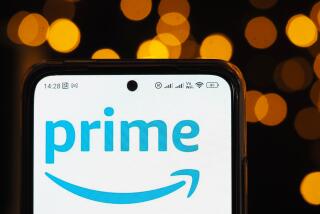AT&T;, Time Warner Discuss Phone Venture
- Share via
Time Warner Inc., the nation’s largest cable operator, and AT&T;, the largest long-distance carrier, have worked out the broad outline of a plan to offer local phone service over the entertainment company’s cable wires, according to sources close to the negotiations.
The deal could still break down over unresolved details. But sources said the two sides are discussing forming a new venture for delivering local phone service that would be about three-quarters owned by AT&T; and the rest by Time Warner.
An agreement between the companies would give AT&T; a huge boost toward offering the first national brand for local telephone service since the 1984 court-ordered breakup of the phone giant’s local operation into several regional Bell companies.
It also would underscore the challenges facing cable companies in the delivery of highly competitive, capital-intensive and discounted services such as telephone.
With deregulation of the telephone business, AT&T; is eager to compete in the local telephone business to offset severe price-cutting in the long-distance sector that has eroded its profitability and that could get worse as regional phone providers step into the competition. Taking a major step in that direction, the phone giant agreed in June to acquire Tele-Communications Inc. in a $32-billion transaction that will give AT&T; access to nearly 18 million households in its service area and another 15 million homes it reaches through about a dozen partnerships with other cable operators.
AT&T; has since been in talks with other major cable companies to fill the gaps in its national footprint. Time Warner is the cornerstone of this plan, reaching about 18 million homes with its cable wires, including a large portion of New York City, where it serves 1.5 million customers.
Although Time Warner has acknowledged talks with AT&T;, neither company would comment Tuesday on the details of those negotiations, which the phone giant had hoped to announce at the cable industry’s annual Western Show, which starts today in Anaheim.
Time Warner Chairman Gerald Levin has expressed interest in “leasing” space on the company’s cable network to a major phone provider such as AT&T; as a way of squeezing more value from facilities that have required huge investments to retrofit for two-way communications. Although conventional cable television is a one-way proposition, new services such as high-speed connections to the Internet and telephone require two-way networks.
Like other cable operators, Time Warner already is offering high-speed Internet service in certain markets, but it has been less aggressive than counterparts such as Cox Communications, Media One and Cablevision Systems Corp. in providing phone services, failing to expand beyond one test market in Rochester, N.Y.
Though extremely bullish about offering data, voice and video via cable lines in the mid-1990s, Time Warner became cautious about the prospects of phone delivery because of concerns about the reliability of the technology and the economics of competing against entrenched Baby Bells.
Cox has lured thousands of customers away from Pacific Bell in Orange County--largely by offering a substantial discount that may be uneconomical to sustain.
Some cable operators believe they would have a better chance of winning customers without resorting to discounts by associating with AT&T;, one of the most trusted brand names in business. “Our view is that by the year 2001, there will be an AT&T-branded; local telephone service, with cable operators coming in as partners taking various levels of risk,” said Jessica Reif Cohen, an analyst at Merrill Lynch.
She said Time Warner may be willing to give up a substantial upside in the telephone business in exchange for AT&T;’s expertise, its strong brand name and the additional capital required to upgrade its facilities for delivering phone service.
Under the prospective deal, the new venture would pay Time Warner a fixed upfront fee for access to the 18 million homes in its cable franchises nationwide.
Reif Cohen estimates that fee at $12 for every home passed, or more than $200 million, with AT&T; bearing about $150 million of that based on its ownership stake.
In addition, the new venture would pay Time Warner a monthly fee for every telephone subscriber who signs up.
Reif Cohen estimates that fee at about $1.50 per subscriber per month. If AT&T; got 25% of Time Warner’s 18 million households to sign up, that would amount to more than $80 million a year.
Time Warner would also reap 25% of any profit from using its cable wires to deliver phone service.
Reif Cohen said AT&T; was entitled to a majority of the profit to recoup its upfront investment, and that its controlling interest in the venture meant it would also bear the brunt of the costs for upgrading the facilities for phone--by some estimates as much as $450 per home. Based on that estimate, making phone service available to every Time Warner customer would cost more than $8 billion.
Sources said Time Warner would get the best deal offered by AT&T; because it has the biggest footprint and some of the most advanced cable systems in place.
AT&T; has offered similar but less lucrative proposals to mid-sized cable operators, including Cablevision, Cox and Comcast.
More to Read
The biggest entertainment stories
Get our big stories about Hollywood, film, television, music, arts, culture and more right in your inbox as soon as they publish.
You may occasionally receive promotional content from the Los Angeles Times.










